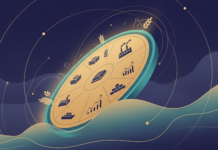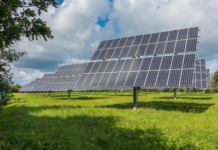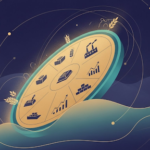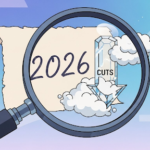In a world where nearly 1 in 10 people go to bed hungry every night, food security is arguably the single biggest problem facing humanity.
And it’s a problem that’s only going to get worse.
In fact, by 2050, the world’s population could increase from today’s 8.1 billion to as many as 9.8 billion people, which will place an even greater strain on our global food supply.
At the same time, a warming climate and more frequent supply chain disruptions are threatening agricultural productivity, with governments around the world struggling to ensure the supply of our most critical resource.
After all, no matter what type of changes we may see in the world – from medicine to energy, or travel to technology – the one constant is that human beings will always need food.
The United Nations Food and Agriculture Organization (FAO) projects that the global demand for food will increase by 60% over the next two decades.
Obviously, we can’t expand the size of our planet to produce all of this extra food. In fact, the amount of available arable land continues to decrease.
This means the key to countering global starvation is growing more food more efficiently.
And one secret to doing so might just be Brazil Potash (NYSE:GRO).
Brazil: One of the World’s Largest Exporters of Agricultural Products
Thanks to Brazil’s abundant land and water as well as its year-round global climate, Brazil is the world’s largest net exporter of agricultural products.
In fact, Brazilian agricultural exports reached a record high level of US$166.55 billion in 2023 and accounted for 49% of Brazil’s total exports.
And one of the keys to Brazil’s critically important agricultural production is fertilizer…and more specifically, potash.
Potash is a potassium-rich fertilizer that is key to one of the three main nutrients needed to successfully grow food.
It could well be the critical ingredient in solving the world’s food security problems, and Brazil Potash (NYSE:GRO) is determined to help secure its supply
Brazil’s agricultural industry is extremely vulnerable because as of right now Brazil is importing roughly 98% of the potash it uses to grow food, primarily from Canada, Russia and Belarus.
Without easy access to that potash, Brazil’s ability to grow food would be severely diminished at a time when global food security is teetering on the brink.
That’s why Brazil Potash (NYSE:GRO) is so important…and why early investors could see significant upside potential.
The company is now developing a potentially massive potassium-rich project – the Autazes Potash Project – that could ultimately become one of the top strategic and scalable sources of potash in the world.
By working to harvest what could be one of the world’s largest deposits – located within Brazil – Brazil Potash figures to enjoy a substantial and sustainable cost advantage for this essential nutrient to grow food.
The World Is Heavily Reliant on Brazil for Agricultural Production
As mentioned earlier, with $166.55 billion in agricultural exports in 2023, Brazil ranks #1 in production for many of the world’s highest-demand and potash-intensive crops, such as soybean and sugarcane.
For many of the things you consume on a daily basis, including orange juice, coffee and sugar, Brazil is among the world’s leading producers.
And Brazil has abundant arable land, fresh water and an ideal climate to grow the crops needed to help feed the world.
It just needs more fertilizer.
According to a 2023 market research report by Grand View Research, the global market for potash was an estimated $57.7 billion in 2022 and is expected to exceed $93 billion by 2032.

This growth is to be propelled by the growing demand for food and agricultural products worldwide as well as the need for improved crop yields and agricultural productivity.
Brazil is currently the world’s second largest consumer of potash and the country is now 98% reliant on imports for its supply of potash.

IMAGE SOURCE: Brazil Potash Prospectus
As a result, over 1.4 million tons of Greenhouse Gas emissions are unnecessarily generated from maritime transportation and potash production in jurisdictions with higher emission factors.
Brazil’s potash consumption is projected to grow at a rate of 6.8% per year from 2023 to 2027 and Brazil is now responsible for the majority of South American potash consumption.
This is the case because, while Brazil does have abundant arable land and great conditions for growing crops, its soils require constant potassium replenishment.
That’s why Brazil Potash (NYSE:GRO) offers such a unique opportunity.
In fact, it believes it can become one of the lowest-cost producers in the world because of its location in Brazil. And the company already has an offtake agreement in place – and the potential to quickly capture significant market share.
Brazil Potash Seeks to Become the World’s Lowest-Cost Producer of Potash to Brazil
Brazil Potash is working to develop one of the world’s largest basins right in the location where it’s needed most.
The company has advanced its Autazes Potash Project to a near construction-ready state. To date, the company has raised approximately US$270 million for project development including completion of land purchases, engineering studies and environmental & social impact assessments.
The Autazes Project is strategically located, as it is close to the inland Madeira River which connects to major Brazilian farming regions, making it easier and relatively low cost to transport potash to customers.

IMAGE SOURCE: Brazil Potash Prospectus
The potash that Brazil is currently importing can travel from as far away as Canada, Russia or Belarus – sometimes spanning 12,000 miles using multiple modes of transportation.
That means there are significant costs involved just to get the potash to where it’s needed to help replenish Brazilian soil.
Contrast that with Brazil Potash (NYSE:GRO), whose Autazes Project could potentially mine, process and deliver potash to Brazilian farmers with a lower cost than the transportation cost alone for imported potash from foreign competitors.
The Autazes Project is located in the Amazon potash basin on cattle farming land, which is in the eastern portion of the State of Amazonas between the Amazon River and the Madeira River.
In fact, the Autazes Project is located only approximately 5 miles from the Madeira River, enabling efficient and reliable transportation primarily by river barge with final leg by truck that can take the product inland to key agricultural regions.
Brazil Potash’s management anticipates the Autazes Project will enable the company to extract, process and deliver potash for a lower cost that importers pay for transportation alone.
This substantial cost savings gives the company a significant competitive advantage in the marketplace.
Large Scale: Potential Production of 2.4 Million Tons of Potash Per Year
Brazil Potash believes the Autazes Project has the potential to be one of the top strategic and scalable sources of potash in the world.
And the size of the project is just as impressive as the cost savings it offers.
The Autazes Project is estimated to have a reserve project life of 23 years based on drilling only a very small portion of the potential basin.
In August 2024, Brazil Potash (NYSE:GRO) announced that it is now fully permitted to construct the Autazes Project.
Following construction, the company’s management projects production of 2.4 million tons of potash per year with the potential to supply 20% of Brazil’s current annual consumption.
Based on that projected production of 2.4 million tons of potash, the company projects close to US$1 billion of EBITDA.
Non-Exclusive Offtake Agreement Signed for approximately 550,000 Tons of Potash Per Year
Another illustration of the high demand for potash within Brazil – and the potential upside for Brazil Potash overall – is the fact that the company has already locked-in a significant offtake agreement for its potash with one of the largest farmers in Brazil.
Brazil Potash’s agreement with Amaggi Group is actually a three-part agreement for a 15 to 17-year term and includes:
- A take-or-pay offtake agreement for 550,000 tons of potash per year
- A marketing agreement to sell Brazil Potash’s remaining potash per year
- And a barge transportation agreement to ship the initial planned 2.4 million tons of potash per year of production to inland ports close to major farming regions within Brazil.
In addition, on November 1, 2024, Brazil Potash signed a royalty option agreement with Franco-Nevada Corporation, the world’s leading gold-focused royalty and streaming company.
This option agreement provides the option for Franco-Nevada Corporation to purchase a 4.0% gross revenue royalty on potash produced from the Autazes Project in exchange for investing significant cash for Autazes construction.
A Sustainable Potash Project Critical to Brazil
As mentioned earlier, ensuring a consistent, reliable supply of potash is essential to the success of the Brazilian agriculture industry.
And the government of Brazil clearly recognizes this, having launched a National Fertilizer Plan in March of 2022.
This plan is intended to reduce Brazil’s dependence on fertilizer imports from 85% to 45% by 2050.
Specifically, the plan’s goals for 2030 call for increasing domestic production of potash to 2.2 million tons per year and to 6.6 million tons per year by 2050.
Luiz Inacio Lula da Silva, President of Brazil, said, “A country that has the agricultural wealth of Brazil cannot be dependent upon fertilizers from another country. We must have the capacity, competence and political will to transform this country into being a self-sufficient country.”
Brazil’s National Fertilizer Plan has the potential to benefit Brazil Potash with reduced tax rates and greater access to government-backed funds as the company continues its development of the Autazes Project.
Brazil Potash (NYSE:GRO) is committed to helping increase the production of potash domestically within Brazil and doing so in a way that is sustainable and environmentally sound.
Brazilian-produced potash may reduce greenhouse gas emissions by an estimated 80% compared to potash produced and shipped from Saskatchewan, Canada, which currently accounts for 32% of all potash consumed in Brazil and 38% of global consumption.
Potash from Canada travels along railways, on ships, and trucks to its final destination in Brazil, emitting roughly 1.4M tons CO2 per year more than Brazil Potash is expected to emit.
For just the Autazes deposit, at a production rate of 2.4 million tons per year, potash produced that displaces imported potash, is expected to result in a reduction of greenhouse gas emissions equivalent to planting 56 million new trees.
Additionally, Brazil Potash’s work in the region will have a significant positive impact on the municipality of Autazes.
Brazil Potash anticipates creating significant direct jobs during the installation phase and during the operations phase. Each direct job is projected to create four to five additional indirect jobs.
And the municipality will benefit from an increase in tax revenues and will have more funds that can be invested in schools, water quality, roads and healthcare services.
Brazil Potash (NYSE:GRO) is Guided by an Experienced Team with Mine Construction, Operations and Potash Sales Experience
Incoming Executive Chairman Mayo Schmidt led the merger of Potash Corporation and Agrium to form Nutrien, the world’s largest fertilizer producer with ~$34 billion market capitalization, where he was Chairman and then CEO. He is also the architect behind Viterra, which he grew to a $7.3 billion company after having taken over the struggling Saskatchewan Wheat Pool.
Chief Executive Officer Matt Simpson has a well-rounded background of designing and constructing mines internationally while working for Hatch engineering, and later operating a large
Rio Tinto-owned mine with 650 reports and a US$300M/year budget.
Adriano Especschit, President of Potassio do Brasil Ltda., Brazil Potash’s operating subsidiary in Brazil, previously worked for Vale, BHP Billiton in Australia, and Shell Canada with Fort McKay First Nation in Alberta.
Vice President of Sales Marcos Pedrini has extensive hands-on experience selling and arranging delivery of potash in Brazil, from his over 35 years of experience, primarily with Vale, where he retired as General Manager, Agriculture Sales.
And just recently – in July 2024 – the company announced the formation of an advisory board to provide further expertise in the sector, the region and in the area or investor relationship experience.
The board includes Katia Abreau, a former Brazil Minister of Agriculture and Senator, Cidinho Santos, former Senator Mato Grosso State, and Luis Adams, former Attorney General of Brazil.
Executive Summary
With Brazil’s agricultural exports so important to the world’s food supply – and with the country currently importing 98% of the potash it uses to grow food – there is tremendous need for Brazilian-based supplies to be developed.
Brazil Potash is at the forefront of this development with its massive Autazes Project, which has the potential to become one of the top strategic and scalable sources of potash in the world.
Thanks to its ideal location in the Amazon potash basin, this project offers a substantial and sustainable cost advantage for the company.
With the project now fully permitted for construction and moving closer to operations – and with key offtake and distribution and marketing agreements in place – Brazil Potash appears to be uniquely positioned to deliver significant potential upside for investors in the months ahead.
** IMPORTANT NOTICE AND DISCLAIMER — PLEASE READ CAREFULLY! **
PAID ADVERTISEMENT. This article is a paid advertisement. FTB Capital and its owners, managers, employees, and assigns (collectively “the Publisher”) is often paid by one or more of the profiled companies to disseminate these types of communications. In this case, the Publisher has been compensated by Brazil Potash Corp. (NYSE:GRO) to conduct investor awareness advertising and marketing. Brazil Potash paid two hundred and sixty thousand dollars for the creation and dissemination of this article and related articles and banner ads, one hundred and forty thousand dollars of which was paid to the Publisher. This compensation should be viewed as a major conflict with our ability to be unbiased.
Readers should beware that third parties, profiled companies, and/or their affiliates may liquidate shares of the profiled companies at any time, including at or near the time you receive this communication, which has the potential to hurt share prices. Frequently companies profiled in our articles experience a large increase in volume and share price during the course of investor awareness marketing, which often ends as soon as the investor awareness marketing ceases. The investor awareness marketing may be as brief as one day, after which a large decrease in volume and share price may likely occur.
This communication is not, and should not be construed to be, an offer to sell or a solicitation of an offer to buy any security. Neither this communication nor the Publisher purport to provide a complete analysis of any company or its financial position. The Publisher is not, and does not purport to be, a broker-dealer or registered investment adviser. This communication is not, and should not be construed to be, personalized investment advice directed to or appropriate for any particular investor. Any investment should be made only after consulting a professional investment advisor and only after reviewing the financial statements and other pertinent corporate information about the company. Further, readers are advised to read and carefully consider the Risk Factors identified and discussed in the advertised company’s SEC and/or other government filings. Investing in securities is speculative and carries a high degree of risk. Past performance does not guarantee future results. This communication is based on information generally available to the public, and does not (to the Publisher’s knowledge, as confirmed by Brail Potash) contain any material, non-public information. The information on which it is based is believed to be reliable. Nevertheless, the Publisher cannot guarantee the accuracy or completeness of the information.
SHARE OWNERSHIP. The Publisher does not own shares and/or options of the featured company. However, a third party marketing company that assisted in the production and distribution of these materials is a shareholder in the company, and therefore has an additional incentive to see the featured company’s stock perform well. The Publisher does not undertake for itself or others any obligation to notify the market when a decision is made to buy or sell shares of the issuer in the market. This is why we stress that you conduct extensive due diligence as well as seek the advice of your financial advisor or a registered broker-dealer before investing in any securities.
FORWARD LOOKING STATEMENTS. This publication contains forward-looking statements, including statements regarding expected continual growth of the featured company and/or industry. The Publisher notes that statements contained herein that look forward in time, which include everything other than historical information, involve risks and uncertainties that may affect the companies’ actual results of operations. Factors that could cause actual results to differ include, but are not limited to, government regulations concerning potash production, the size and growth of the market for potash, the companies’ ability to fund its capital requirements in the near term and long term, pricing pressures, etc.
INDEMNIFICATION/RELEASE OF LIABILITY. By reading this communication, you acknowledge that you have read and understand this disclaimer, and further that to the greatest extent permitted under law, you release the Publisher, its affiliates, assigns and successors from any and all liability, damages, and injury from this communication. You further warrant that you are solely responsible for any financial outcome that may come from your investment decisions.
TERMS OF USE. By reading this communication you agree that you have reviewed and fully agree to the Terms of Use found here http://GlobalInvestmentDaily.com/Terms-of-Use. If you do not agree to the Terms of Use http://GlobalInvestmentDaily.com/Terms-of-Use, please contact GlobalInvestmentDaily.com to discontinue receiving future communications.
INTELLECTUAL PROPERTY. GlobalInvestmentDaily.com is the Publisher’s trademark. All other trademarks used in this communication are the property of their respective trademark holders. The Publisher is not affiliated, connected, or associated with, and is not sponsored, approved, or originated by, the trademark holders unless otherwise stated. No claim is made by the Publisher to any rights in any third-party trademarks.

























